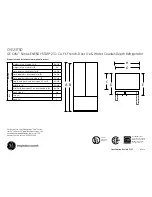
EN -9-
CHAPTER -4: FOOD STORAGE GUIDANCE
CHAPTER -5: DOOR REVERSAL
Repositioning the door
•
It depends on which fridge freezer you have as to whether it is possible the reverse the doors.
•
It is not possible where handles are attached at the front of the appliance.
•
If your model does not have handles it is possible to reverse the doors, but this needs to be completed by
authorised personnel. Please call Sharp service.
•
The taste of some spices found in cooked dishes (anise, basilica, watercress, vinegar, assorted spices, ginger,
garlic, onion, mustard, thyme, marjoram, black pepper, etc.) changes and they assume a strong taste when they
are stored for a long period. Therefore, only add a small amount of spice if planning to freeze, or the desired
spice should be added after the food has been thawed.
•
The storage period of food is dependent on the oil used. The suitable oils are margarine, calf fat, olive oil and
butter and the unsuitable oils are peanut oil and pig fat.
•
The food in liquid form should be frozen in plastic cups and the other food should be frozen in plastic folios or
bags.
CHAPTER -6: TROUBLESHOOTING
Check Warnings;
If your fridge is not operating;
•
Is there any electrical fault?
•
Is the plug is placed properly in the socket outlet?
•
Is the fuse of the socket outlet that the plug is plugged or the main fuse blown?
•
Is the thermostat setting is on “ ” position?
•
Is there any fault in the socket outlet? Examine this by plugging your fridge into a socket outlet which you are
sure that is working.
If your fridge is not cooling enough;
•
Is the thermostat setting is on “1” position?
•
Is the door of your fridge opened frequently and left open for a long while?
•
Is the door of fridge closed properly?
•
Did you put a dish or food on your fridge so that it contacts the rear wall of your fridge so as to prevent the air
circulation?
• Is your fridge filled excessively?
•
Is there adequate distance between your fridge and the rear and side walls?
• Is the ambient temperature within the range of values specified in the operating manual?
If the food in your refrigerator compartment is over cooled
•
Is the thermostat adjustment right?
•
Are there many food recently put inside the freezer compartment? If so, your fridge may over cool the food
inside the refrigerator compartment as it will operate longer to cool these food.
If your fridge is operating too loudly;
To maintain the set cooling level, compressor may be activated from time to time. Noises from your fridge at this time
are normal and due to its function. When the required cooling level is reached, noises will be decreased automatically.
If the noises persist;
•
Is your appliance stable? Are the legs adjusted?
•
Is there anything behind your fridge?
•
Are the shelves or dishes on the shelves vibrating? Re-place the shelves and/or dishes if this is the case.
•
Are the items placed on your fridge vibrating?
Normal Noises;
Cracking (Ice cracking) Noise:
•
During automatic defrosting.
•
When the appliance is cooled or warmed (due to expansion of appliance material).
Short cracking: Heard when the thermostat switches the compressor on/off.
Compressor noise (Normal motor noise): This noise means that the compressor operates normally Compressor
may cause more noise for a short time when it is activated.
Bubbling noise and splash:
This noise is caused by the flow of the refrigerant in the tubes of the system.
Water flow noise:
Normal flow noise of water flowing to the evaporation container during defrosting. This noise
can be heard during defrosting.
Air Blowing Noise (Normal fan noise): This noise can be heard in No-Frost fridge during normal operation of
the system due to the circulation of air.
Содержание SJ-B1297M0I-EU
Страница 2: ......
Страница 140: ...Waterside Drive Langley Berkshire SL3 6EZ UNITED KINGDOM 52173251 ...












































